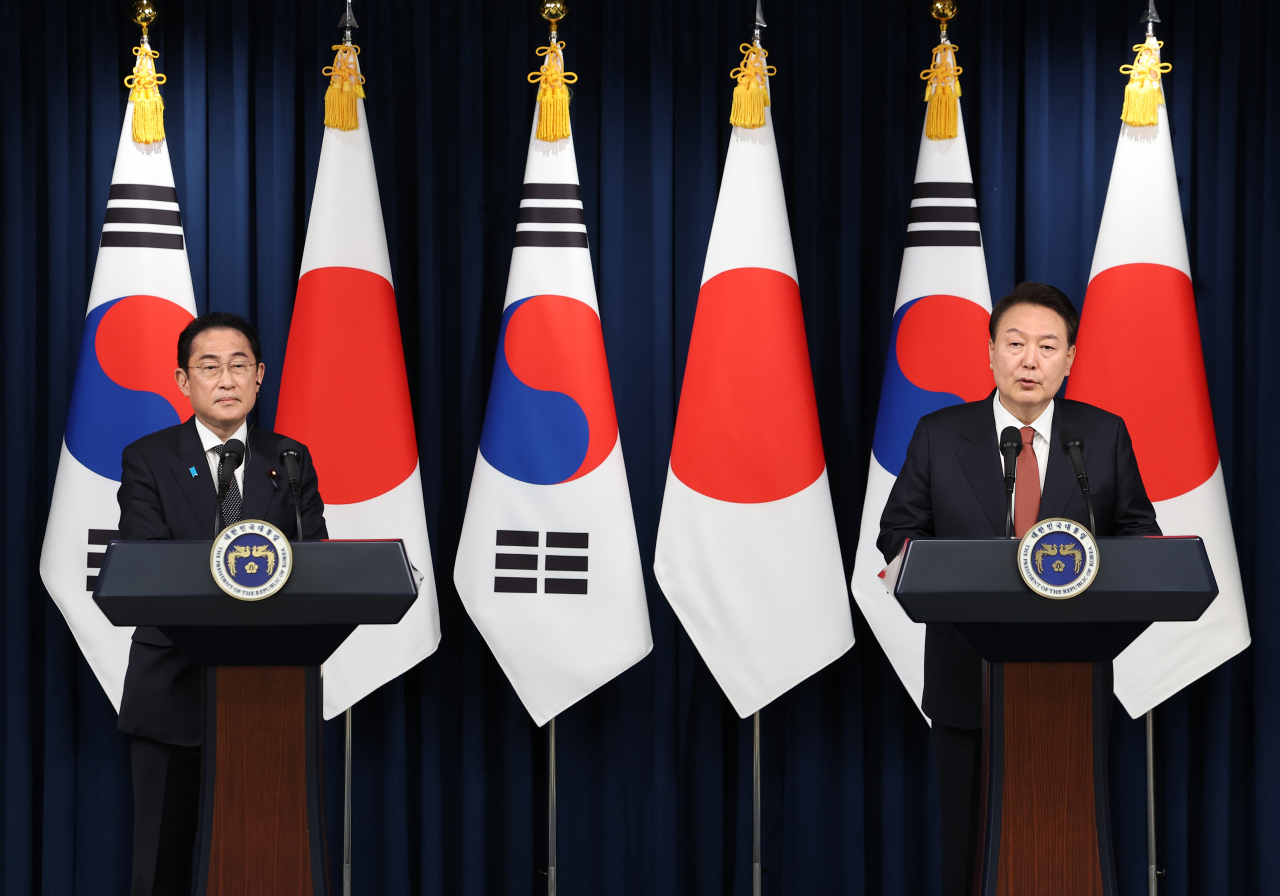 |
President Yoon Suk Yeol (right) and Japanese Prime Minister Fumio Kishida speak during a press conference following talks at South Korea’s presidential office in Seoul on Sunday. (Yonhap) |
The latest remarks by the Japanese prime minister over Korean victims of forced labor during Japan’s 1910-45 rule of the peninsula have raised more questions than answers as the two countries seek closer ties by ending the dispute, experts said Monday.
“I personally feel my heart ache at the thought of countless people having gone through very challenging and sad times under extreme conditions,” Prime Minister Fumio Kishida said at a press conference Sunday, following talks with President Yoon Suk Yeol in Seoul. The two-day trip ended Monday.
It was the first time Kishida, who was reciprocating Yoon’s trip to Tokyo in mid-March for ties, openly discussed the matter beyond reaffirming Japan’s past apology for its colonial rule, which the Korean and Japanese leaders signed into the 1998 Seoul-Tokyo declaration. The agreement has served as a guidance for friendlier ties.
Koreans calling for the Japanese leader to offer an apology for the colonial rights abuses in particular, as per a 2018 Korean court ruling that held Japanese firms liable for damages, are discontent with Kishida’s “outreach” to the Korean victims. The Japanese companies still refuse to recognize the ruling.
“Kishida’s remarks are so carefully crafted that in essence, they mean little to nothing,” said Cho Seong-ryoul, a professor at the University of North Korean Studies who previously served as South Korea’s consul general in Osaka, Japan.
Cho noted that Kishida did not specifically refer to Korean victims or the fact that they had been forced to work for Japanese companies against their will -- an intended oversight meant to be a nod to the dispute but not an “acknowledgement of anything that would resolve the feud and set the history straight.”
“What makes me suspicious of Kishida’s ‘sincerity’ is the fact that Japan is still waging a battle on multiple fronts, historically speaking,” Cho said, referring to Japan’s claims to Dokdo, a group of islets controlled by South Korea. Last month, Korea summoned the Japanese ambassador in Seoul over renewing such claims in Tokyo’s annual foreign policy review.
However, Choi Eun-mi, a research fellow at the Asan Institute for Policy Studies, sees the latest development differently, saying the remarks could be a “start and not the end.”
“I have to admit, what Kishida said might fall far short of what the victims and groups representing or sympathizing with them have demanded. But he has done what he could do on his own,” Choi said.
It remains to be seen how the latest development would affect public opinion in the months to come, Choi added, saying the two neighbors should carry on with regular exchanges to discuss pending issues.
Jin Chang-soo, director of the center for Japanese studies at the Sejong Institute, said those exchanges should take place more frequently and quickly, referring to what Seoul and Tokyo see as “common” threats from an increasingly provocative North Korea as well as an emboldened China. The successive summits have focused on them.
“I’m not saying we declare closure right now, but we can’t be mired in disputes in a way that prevents us from bolstering ties and advancing shared interests,” Jin said, echoing what Yoon said of the Sunday meeting with Kishida. The Korean leader highlighted the need to move forward, and avoid being taken hostage by historical disputes.







![[Today’s K-pop] Blackpink’s Jennie, Lisa invited to Coachella as solo acts](http://res.heraldm.com/phpwas/restmb_idxmake.php?idx=644&simg=/content/image/2024/11/21/20241121050099_0.jpg)